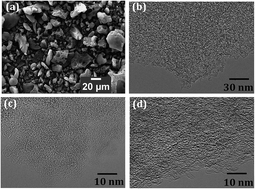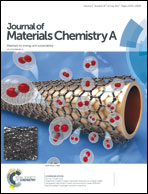Unrivaled combination of surface area and pore volume in micelle-templated carbon for supercapacitor energy storage†
Abstract
We created Immense Surface Area Carbons (ISACs) by a novel heat treatment that stabilized the micelle structure in a biological based precursor prior to high temperature combined activation – pyrolysis. While displaying a morphology akin to that of commercial activated carbon, ISACs contain an unparalleled combination of electrochemically active surface area and pore volume (up to 4051 m2 g−1, total pore volume 2.60 cm3 g−1, 76% small mesopores). The carbons also possess the benefit of being quite pure (combined O and N: 2.6–4.1 at%), thus allowing for a capacitive response that is primarily EDLC. Tested at commercial mass loadings (∼10 mg cm−2) ISACs demonstrate exceptional specific capacitance values throughout the entire relevant current density regime, with superior rate capability primarily due to the large fraction of mesopores. In the optimized ISAC, the specific capacitance (Cg) is 540 F g−1 at 0.2 A g−1, 409 F g−1 at 1 A g−1 and 226 F g−1 at a very high current density of 300 A g−1 (∼0.15 second charge time). At intermediate and high currents, such capacitance values have not been previously reported for any carbon. Tested with a stable 1.8 V window in a 1 M Li2SO4 electrolyte, a symmetric supercapacitor cell yields a flat energy–power profile that is fully competitive with those of organic electrolyte systems: 29 W h kg−1 at 442 W kg−1 and 17 W h kg−1 at 3940 W kg−1. The cyclability of symmetric ISAC cells is also exceptional due to the minimization of faradaic reactions on the carbon surface, with 80% capacitance retention over 100 000 cycles in 1 M Li2SO4 and 75 000 cycles in 6 M KOH.



 Please wait while we load your content...
Please wait while we load your content...